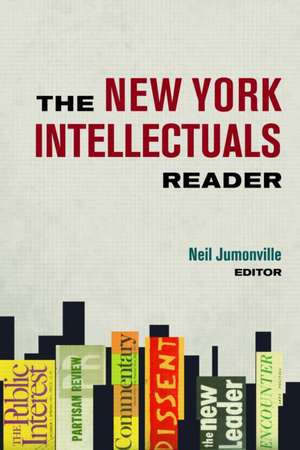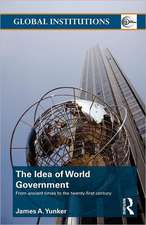The New York Intellectuals Reader
Editat de Neil Jumonvilleen Limba Engleză Paperback – 18 apr 2007
Here, with helpful head notes and a comprehensive introduction by Neil Jumonville, The New York Intellectuals Reader brings the work of these thinkers back into conversation.
| Toate formatele și edițiile | Preț | Express |
|---|---|---|
| Paperback (1) | 442.89 lei 6-8 săpt. | |
| Taylor & Francis – 18 apr 2007 | 442.89 lei 6-8 săpt. | |
| Hardback (1) | 1073.74 lei 6-8 săpt. | |
| Taylor & Francis – 18 apr 2007 | 1073.74 lei 6-8 săpt. |
Preț: 442.89 lei
Nou
Puncte Express: 664
Preț estimativ în valută:
84.76€ • 88.26$ • 71.63£
84.76€ • 88.26$ • 71.63£
Carte tipărită la comandă
Livrare economică 08-22 martie
Preluare comenzi: 021 569.72.76
Specificații
ISBN-13: 9780415952651
ISBN-10: 0415952654
Pagini: 456
Dimensiuni: 152 x 229 x 26 mm
Greutate: 0.61 kg
Ediția:1
Editura: Taylor & Francis
Colecția Routledge
Locul publicării:Oxford, United Kingdom
ISBN-10: 0415952654
Pagini: 456
Dimensiuni: 152 x 229 x 26 mm
Greutate: 0.61 kg
Ediția:1
Editura: Taylor & Francis
Colecția Routledge
Locul publicării:Oxford, United Kingdom
Recenzii
"That famous alcove at the City College of New York where, in the 1930s, students met and argued the merits of Marx, chose between Trotsky and Stalin, pondered the future of socialism, and laid the intellectual foundations for the second half of the 20th century, is restored in this remarkable collection. The names are familiar--Sidney Hook, Alfred Kazin, Irving Kristol, Hannah Arendt, Dwight Macdonald, Paul Goodman, Lionel Trilling, Clement Greenberg, Norman Podhoretz, etc.--and the subjects remain contentious and pertinent. Neil Jumonville, a historian at Florida State, provides the pertinent biographical data, and completes the definitive portrait of these remarkable essayists, to whom we are all indebted." -- Philip Terzian, The Weekly Standard, June 25, 2007 - July 2, 2007, BOOKS & ARTS Vol. 12 No. 39
"A specialist on the New York intellectuals, Jumonville provides a terrific, albeit brief introduction to thie important collection of several of the group's noteworthy essays. The public intellectuals sought to reach a broad audience, transcend disciplinary boundaries, and grapple with significant contemporary issues. ... " -- CHOICE March 2008 Vol. 45 (R.C. Cottrell, California State University)
"A specialist on the New York intellectuals, Jumonville provides a terrific...introduction to this important collection of several of the group's noteworthy essays. (The New York Intellectuals) sought to reach a broad audience, transcend disciplinary boundaries, and grapple with significant contemporary issues." "Recommended." -Choice
"A specialist on the New York intellectuals, Jumonville provides a terrific, albeit brief introduction to thie important collection of several of the group's noteworthy essays. The public intellectuals sought to reach a broad audience, transcend disciplinary boundaries, and grapple with significant contemporary issues. ... " -- CHOICE March 2008 Vol. 45 (R.C. Cottrell, California State University)
"A specialist on the New York intellectuals, Jumonville provides a terrific...introduction to this important collection of several of the group's noteworthy essays. (The New York Intellectuals) sought to reach a broad audience, transcend disciplinary boundaries, and grapple with significant contemporary issues." "Recommended." -Choice
Notă biografică
Neil Jummonville is the William Warren Rogers Professor of History and Chairperson of the Dept. of History at Florida State University. He specializes in U.S. Intellectual History with an emphasis on post WWII liberalism and American Studies. He is the author of two previous books and is currently working with Routledge author Kevin Mattson on a book of essays on the current state of liberalism.
Cuprins
Preface, Acknowledgments, Introduction, I. FINDING NATIVE GROUNDS, 1. Alfred Kazin, Starting Out in the Thirties , 2. Irving Howe, New York in the Thirties , 3. Irving Kristol, Memoirs of a Trotskyist, 4. Mary McCarthy, Philip Rahv, 1908-1973 , 5. Editorial Statement, Partisan Review, 1934, 6. Editorial Statement, Partisan Review, 1937 , 7. Dwight Macdonald, I Choose the West , , II. AGAINST ABSOLUTISM , 8. Sidney Hook, The New Failure of Nerve , 9. Hannah Arendt, Total Domination, 10. Philip Rahv, The Sense and Nonsense of Whittaker Chambers , , III. LIFE AND CULTURE AT MIDCENTURY, 11. Meyer Schapiro, Nature of Abstract Art , 12. Clement Greenberg, Avant-Garde and Kitsch , 13. Dwight Macdonald, Homage to Twelve Judges , 14. Lionel Trilling, Reality in America , 15. Alfred Kazin, The Historian as Reporter: Edmund Wilson and the 1930s, 16. Harold Rosenberg, Twilight of the Intellectuals, 17. Daniel Bell, The End of Ideology in the West, 18. Dwight Macdonald, Masscult & Midcult , 19. Lionel Trilling, On the Teaching of Modern Literature, 20. Susan Sontag, Against Interpretation, , IV. THE COLD WAR, 21. Paul Goodman, To Young Resisters, 22. Irving Kristol, Civil Liberties, 1952—A Study in Confusion, 23. Sidney Hook and Bertrand Russell, A Foreign Policy for Survival: An Exchange, 24. C. Wright Mills and Irving Howe, Intellectuals and Russia: An Exchange, , V. CULTURES AND COUNTERCULTURES, OLD AND NEW LEFTS, 25. Norman Podhoretz, The Know-Nothing Bohemians , 26. Irving Howe, Problems in the 1960s, , RACE AND ETHNICITY, 27. Norman Podhoretz, My Negro Problem—And Ours, 28. Nathan Glazer, Negroes & Jews: The New Challenge to Pluralism, , VI. LEGACIES, LIBERALISM AND THE LEFT AFTER 1965, 29. Michael Walzer, In Defense of Equality , 30. Irving Howe, Socialism and Liberalism: Articles of Conciliation?, , NEOCONSERVATIVISM, 31. Nathan Glazer, On Being Deradicalized, 32. Norman Podhoretz, Between Nixon and the New Politics, 33. Irving Kristol, The Adversary Culture of Intellectuals,
Descriere
In the early 1930’s in a small alcove at City College in New York a group of young, passionate, and politically radical students argued for hours about the finer points of Marxist doctrine, the true nature of socialism, and whether or not Stalin or Trotsky was the true heir to Lenin. These young intellectuals, including Alfred Kazin, Mary McCarthy, Hannah Arendt and Lionel Trilling among others, went on to write for and found some of the most well known political and literary journals of the 20th century. The New York Intellectuals Reader presents selections from this vibrant group of political thinkers and writers, committed to addressing the most important political, social, and cultural questions of the day.











